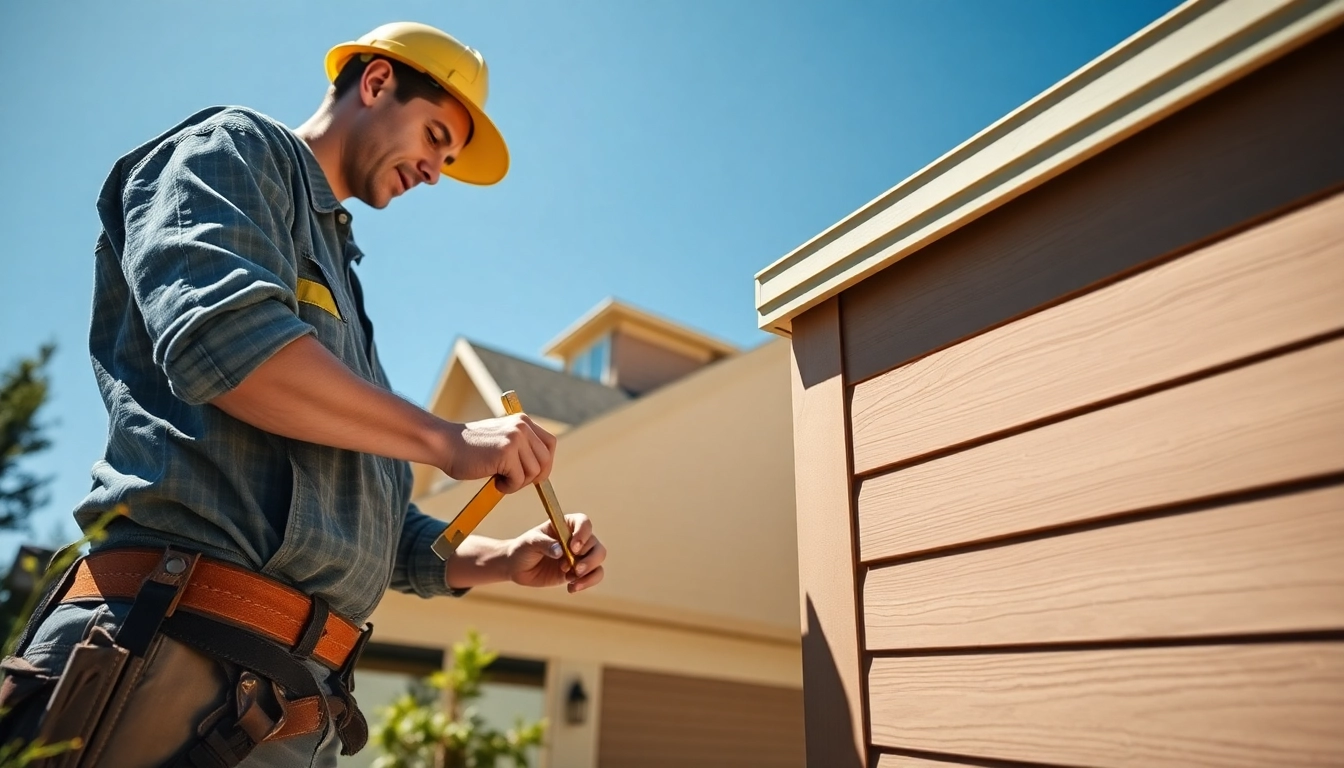Understanding Siding Replacement Portland Oregon
Siding plays a crucial role in protecting your home against external elements and enhancing its aesthetic appeal. In the vibrant city of Portland, Oregon, where rain and humidity can take a toll on exterior structures, understanding the nuances of Siding Replacement Portland Oregon is essential for homeowners. This comprehensive guide will navigate the intricacies of siding replacement, including types of materials, selection criteria, installation processes, and maintenance tips, all tailored to the specific climate and architectural styles found in Portland.
What is Siding Replacement?
Siding replacement refers to the process of removing old siding materials from a building and installing new ones. This process is vital when the current siding is damaged, rotting, or no longer aesthetically pleasing. It can also include upgrading to more energy-efficient materials designed to improve insulation and energy consumption in homes.
Importance of Siding for Your Home
The siding of your home not only influences its visual character but also serves multiple critical functions:
- Protection: Siding acts as the first line of defense against weather-related damage, including rain, snow, and wind.
- Energy Efficiency: Modern siding materials can enhance insulation, contributing to lower heating and cooling costs.
- Curb Appeal: Siding dramatically affects the exterior appearance of your home, which can increase property value and attractiveness to potential buyers.
- Durability: Quality siding can last for decades with proper maintenance, ensuring your investment is worthwhile.
Common Types of Siding Materials in Portland
When considering siding replacement in Portland, understanding the common materials can help inform your decision:
- Vinyl Siding: Popular for its affordability and low maintenance. It is available in various colors and styles but can suffer from fading and cracking over time.
- Fiber Cement Siding: Known for its durability and resistance to rot, insect damage, and extreme weather conditions. It’s often available in a wood-like appearance.
- Wood Siding: Offers a classic aesthetic appeal but requires more maintenance due to susceptibility to rot and insects.
- Metal Siding: Typically made from aluminum or steel, it’s durable and fire-resistant, making it suitable for many architectural designs.
Choosing the Right Siding for Your Home
Factors to Consider When Selecting Siding
Choosing the right siding involves a mix of practicality and personal preference. Here are key aspects to consider:
- Climate: The weather in Portland can be wet and mild, so opt for materials that withstand moisture and resist mold.
- Maintenance: Consider how much time and resources you’re willing to invest in upkeep. Lower maintenance options might save you time and hassle.
- Budget: Assess your budget, as some materials, like fiber cement and wood, may be more of an investment upfront but offer longer-term benefits.
- Architectural Style: The siding should complement your home’s style. Historical homes might benefit from traditional materials, while modern designs can lean towards sleek aluminum or clean vinyl.
Comparing Siding Materials: Pros and Cons
Here’s a quick comparison of some popular siding materials prevalent in Portland:
| Material | Pros | Cons |
|---|---|---|
| Vinyl | Cost-effective, easy installation, low maintenance | Fading colors, less durable in extreme conditions |
| Fiber Cement | Highly durable, fire-resistant, customizable | More expensive, heavier material, requires skilled installation |
| Wood | Natural beauty, excellent insulation | High maintenance, vulnerable to pests, prone to rot |
| Metal | Durable, fire-resistant, low maintenance | Can dent, limited insulation properties |
Local Weather Considerations for Siding
Homes in Portland encounter significant rainfall, with an average of 164 rainy days per year. This necessitates siding that can effectively repel moisture and prevent rot or mold growth. Here are materials that perform well in Portland’s climate:
- Fiber Cement: Resistant to mold, rot, and pests, this material is suitable for the wetter climate.
- Vinyl: Offers a range of colors and profiles while being moisture-resistant.
- Metal: With proper coatings, metal siding can withstand corrosion and moisture.
The Siding Replacement Process Explained
Initial Consultations and Quotes for Siding Replacement Portland Oregon
Before embarking on siding replacement, it is crucial to engage with a qualified contractor for an initial consultation. During this phase:
- The contractor will evaluate your current siding condition, identify any underlying issues, and discuss potential materials.
- You will receive a detailed quote that outlines the expected costs, timeline, and scope of work.
- Ask for references and examples of previous work to ensure you’re comfortable with the contractor’s expertise.
Preparation and Installation Steps
The preparation and installation process typically follows these steps:
- Site Preparation: This includes moving outdoor furniture, plants, and removing old siding materials.
- Damage Repair: Ensure that any underlying damage to sheathing or insulation is addressed before installation begins.
- Siding Installation: Installation will vary depending on the material but generally involves securing the panels, ensuring proper sealing, and installing flashing to protect against water infiltration.
- Final Inspection: Once installed, a final walkthrough will ensure everything is completed to specifications.
Post-Installation Maintenance Tips
To extend the lifespan of your new siding, engage in regular maintenance:
- Regular Cleaning: Wash your siding intermittently to remove dirt, mildew, and any organic growth.
- Inspect for Damage: Annually, check for any signs of damage, including cracks, warping, or insect infestations.
- Paining/Wood Treatment: For wood siding, ensure it is treated and repainted as necessary to protect against rot and pests.
Common Siding Issues and Solutions
Identifying Signs You Need Siding Replacement
It’s essential to recognize when your siding may require replacement:
- Visible damage, such as cracks, splits, or missing panels.
- Signs of water infiltration or mold growth on the interior walls.
- Increased energy bills, which may indicate poor insulation caused by degraded siding.
Repair Options vs. Complete Replacement
Deciding between repairing and replacing siding often depends on the extent of the damage:
- Repair: If the damage is localized, such as a small crack or missing panel, repair options can be viable and cost-effective.
- Replacement: If widespread damage exists, especially if it’s from water infiltration or extensive rot, a full replacement is likely the more prudent option.
Cost-Effective Solutions for Siding Issues
If you’re facing issues with your siding, consider these cost-effective solutions:
- Prompt Repairs: Address minor issues as they arise to prevent more extensive damage and costs later.
- Flexible Financing: Some contractors offer financing plans that can make high-quality materials more accessible.
- Consulting Experts: Engage with insulation specialists who can advise on energy efficiency, which may lower overall costs.
Why Choose Professional Help for Siding Replacement?
Benefits of Hiring Experienced Contractors
While some homeowners may consider a DIY approach, here are compelling reasons to hire professionals:
- Expertise: Experienced contractors have the knowledge and skills to handle complex installations and repairs.
- Time Efficiency: Professionals can complete the job significantly quicker than an inexperienced team.
- Assessing Hidden Issues: Trained eyes can identify problems not visible to the untrained homeowner.
How to Choose a Reliable Siding Contractor in Portland
Choosing the right contractor is crucial for a successful siding replacement project. Here are steps to find a trustworthy professional:
- Check Credentials: Ensure the contractor is licensed, insured, and has positive reviews or testimonials.
- Request Estimates: Compare estimates from multiple contractors to ensure competitive pricing.
- Inquiry about Material Sourcing: A good contractor will offer high-quality materials suited for your local climate.
Understanding the Warranty and Guarantees Offered
Finally, before entering into any agreements, understand the warranties and guarantees involved:
- Ask about material warranties, which often cover defects or issues arising from manufacturing.
- Inquire about the contractor’s workmanship guarantee to ensure you’re covered in case of errors during installation.
- Clarify what’s included in the warranty and any necessary steps to maintain it.






